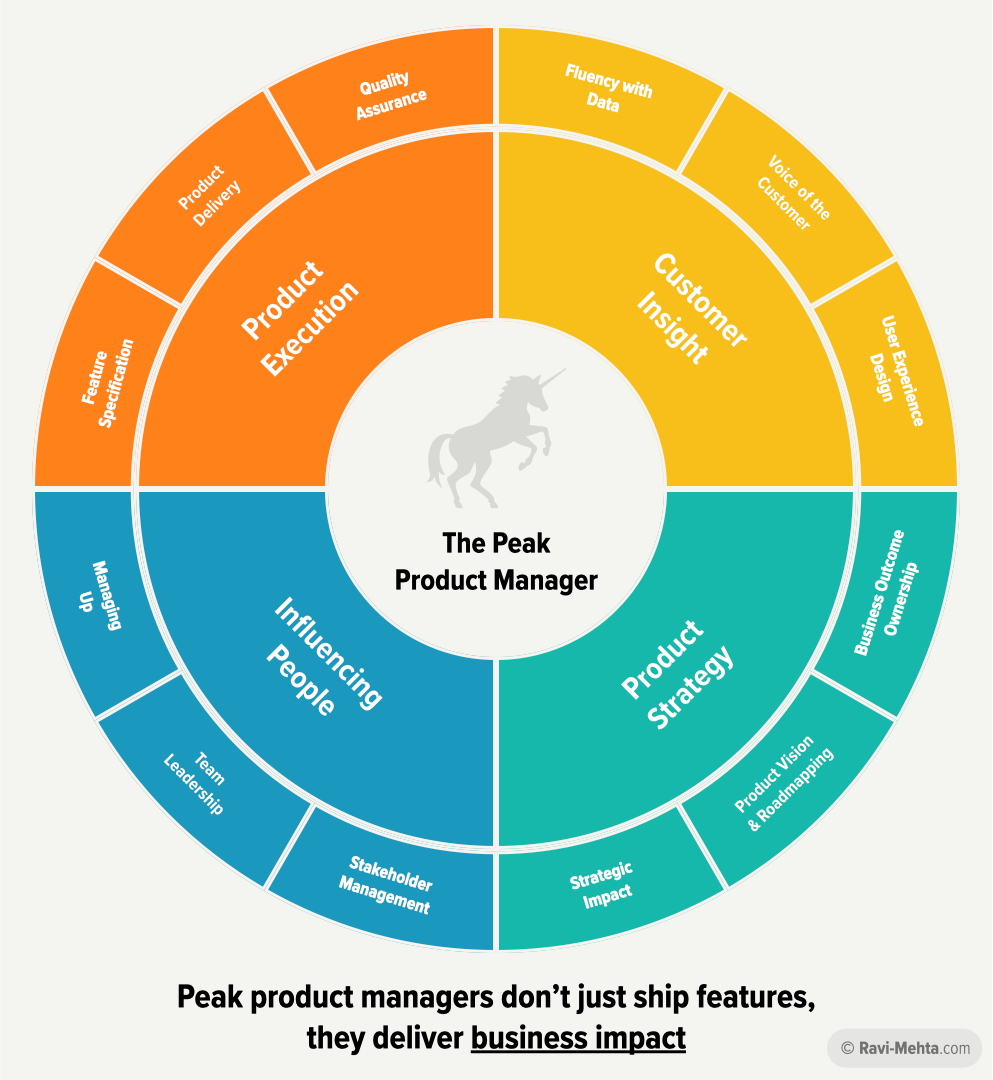Where I Am As a Product Manager, and What Comes Next
Like a lot of people, I dream of starting my own business. I actually tried it once quite recklessly and failed - learned lots of lessons but it was quite painful. So I’m taking a more planned approach instead. My decision to work as a product manager is another step in that plan. My goal here was to learn how to envision, plan, and build successful products. After a year and a half working as a PM, it would be a good idea to review what I’ve gained and what the next step would be.
Among all the articles about PM skillset, Ravi Mehta’s take is my favorite. He divides the skillset into four areas and twelve skills. I recommend reading the full article here for the description of each skill and which skill is important for each career step of a PM.

Here are my expectations when I first took the job: I knew that I would quickly pick up skills under product execution and customer insight categories. My experience as a software engineer gave me insight into the former, while my education in psychology and human-computer interaction gave some foundation for the latter. I was less confident about the influencing people part, but hoped that the communication skills I gained over working as a translator and interpreter would help. Product strategy was my weakness and I wanted to get better at it.
After a year and a half, I have gained solid skills in product execution and customer insight. Influencing people is harder to evaluate, but I can communicate with accuracy and trust, although I’m still working on communicating more frequently and inspiring people. Product strategy is a bit complicated. What I initially thought as product strategy could be represented as something that spans an entire spectrum from product strategy to business strategy.
Marty Cagan talks about it in his blog post: > “Business strategy is about identifying your business objectives and deciding where to invest to best achieve those objectives. For example, moving from a direct sales model (your own sales force selling directly to customers) to an online sales model (your customers buy from your site) is a business strategy. Deciding whether to charge for your services with subscriptions or transactions fees or whether you have an advertising-based revenue model is a business strategy. Deciding to move into an adjacent market is a business strategy. > > Now, clearly there are some big product implications to each of these business strategies. But they are not one in the same. There are lots of ways to sell online, lots of ways to monetize value, and lots of ways to develop or acquire and integrate an adjacent offering. The product strategy speaks to how you hope to deliver on the business strategy. > > Moreover, while the business may believe something is a great business opportunity, you don’t yet know if your company can successfully deliver on this opportunity. Maybe it will cost too much to build. Maybe customers won’t value it enough to pay for it. Maybe it’ll be too complicated for users to deal with. This is where product strategy and especially product discovery come into play.”
I’ve definitely gotten better with product strategy: prioritizing features based on business impact in support of business strategy, setting coherent monthly and quarterly plans to attain business objectives, and delivering business outcomes. I know enough to know what I don’t know, so I would consider myself a journeyman in this area. But that’s only half of the skillset I wanted to acquire.
Business strategy works on a level higher than that of product strategy. Borrowing Marty Cagan’s wording, to set business objectives, I have to understand the market and business trends better; to decide where to invest, I need to get better at operations and capital management. These are the other half of the skillset I wanted. And I’d like to focus on improving them, since they are also essential to running a successful business.
The problem is that while I can still grow as a PM in my current job, it’s an incremental addition to my business capabilities. To grow exponentially, I need to learn those other skills. There are multiple paths to gain them, but obviously the quickest way to learn business is by running one.
But I’m not going to quit my job right now and jump into it with little planning - as I’ve said, I’ve done it before and failed. Instead, my plan is to do a series of minimum viable testing while working in my current job. At least I would gain the skills I want, and they could become a side business or a full business eventually.
As for industries, I’m looking into NFT, blockchain in general, and VR. Those markets are still new, yet there’s enough money in them. I also love that these areas have lots of people with aspirations to change the world, and they are the type of people I’d like to work with. My goal is to run at least one test before the end of this year. I’ll probably share how my tests went on this blog, so you can read about it later and see how it went.